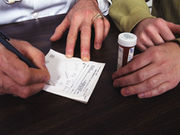Brand name medications not superior to molecularly identical generic medications
TUESDAY, Nov. 24, 2015 (HealthDay News) — Physicians should prescribe generic medications whenever possible, keeping in mind that generics have comparable effectiveness to brand name medications and are associated with reduced costs and increased adherence, according to new guidelines published online Nov. 24 in the Annals of Internal Medicine.
Niteesh K. Choudhry, M.D., Ph.D., from the Brigham and Women’s Hospital in Boston, and colleagues on the Clinical Guidelines Committee of the American College of Physicians conducted a literature review to examine underuse of generic medications. Five questions were asked relating to how commonly brand name medications versus generics are used; adherence with generic medications; comparison of clinical effects for brand name and generic medications; barriers to increasing generic medication use; and strategies to promote cost saving via expanded use of generic medications.
The authors note that brand name medications show no superiority in effectiveness compared with molecularly identical generic medications. Furthermore, use of generics reduces out-of-pocket costs for patients and can encourage better medication adherence. Barriers to use of generics include physician perceptions about generic safety and efficacy, as well as patients’ expectations and preferences. Adoption of electronic health records that notify prescribers about status and costs of medications, a tiered formulary copayment system, prior authorization and step therapy requirements, patient and physician education, and physician performance measures could increase generic medication use.
“Clinicians should prescribe generic medications, if possible, rather than more expensive brand-name medications,” the authors write.
One author disclosed financial ties to CVS Caremark and to pharmaceutical companies.
Full Text
Copyright © 2015 HealthDay. All rights reserved.








